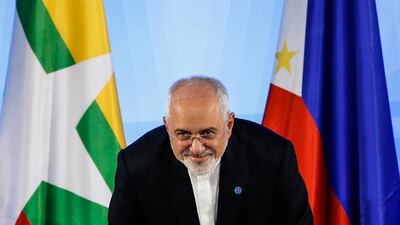As thousands of disillusioned Iranians continue to protest the regime's failures in providing basic services and the Iranian rial falls to a record low, it is plain to see we have reached a watershed moment. From Syria to Yemen, the adventurism of the regime has made Tehran the single greatest source of regional instability. The flawed 2015 nuclear deal, which liberated billions of dollars for the regime, was a facilitator.
It is the meddling of Iran that has brought us to this point and on Tuesday, the Trump administration will reinstate stringent sanctions on the country. Falling between dialogue and outright warfare, economic sanctions are a valuable tool but can hit ordinary people hardest and are dependent on being upheld and respected internationally.
At this critical juncture, it is worth asking whether sanctions could really be effective in curbing such adventurism.
Tuesday's restrictions will block Tehran's access to US dollars and target the country's trade in commodities. Those making large transactions in Iranian rial will face scrutiny. With corruption and mismanagement rife, the economy is already struggling. Meanwhile more than a dozen major companies – including Total, General Electric and Boeing – have already ceased to operate there.
Such losses might initially hit citizens harder than leaders but anger from a civilian population as sanctions bite can prompt a behavioural change at the top. The question is whether a regime that has shown little regard for its people, choosing to spend billions of dollars on exacerbating regional conflicts rather than vital infrastructure, fits that pattern.
A bigger problem, perhaps, is that targeted sanctions exert little power over third parties. Since UN Security Council sanctions first hit Iran in 2006, China has become one of Tehran's foremost trading partners. And in recent days, Iranian Foreign Minister Mohammad Javad Zarif has been courting his counterparts at the Asean summit in Singapore, where the EU's Federica Mogherini said the bloc planned to increase "legitimate economic and trade engagement with Iran even if the United States has decided to impose sanctions". Nor are Russia or Turkey likely to re-evaluate their strong ties with Tehran.
History offers mixed results. After Iraq invaded Kuwait 28 years ago, the US imposed heavy sanctions on Saddam Hussein’s regime. While the results were devastating for ordinary Iraqis, the regime rumbled on for more than a decade.
Sanctions on Chinese-backed North Korea, where famine is frequent, failed to prevent its nuclear proliferation.
And even in countries where radical change did occur, such as apartheid South Africa, sanctions were one factor among many.
Economic restrictions are necessary but cannot work in isolation. Indeed, tough sanctions on Iran signed by Barack Obama in 2010 were largely ineffective. While the Iranian people should not be made to suffer unduly, further pressure on the regime is vital. Sanctions should be part of a concerted move to bring the regime to account.

